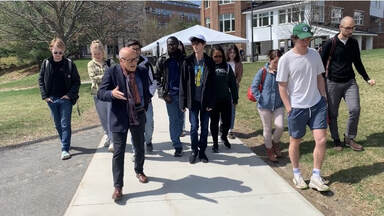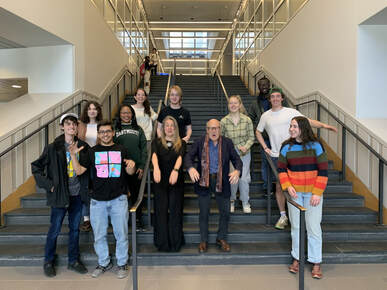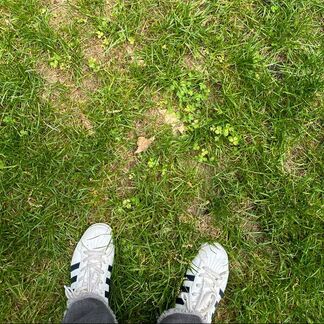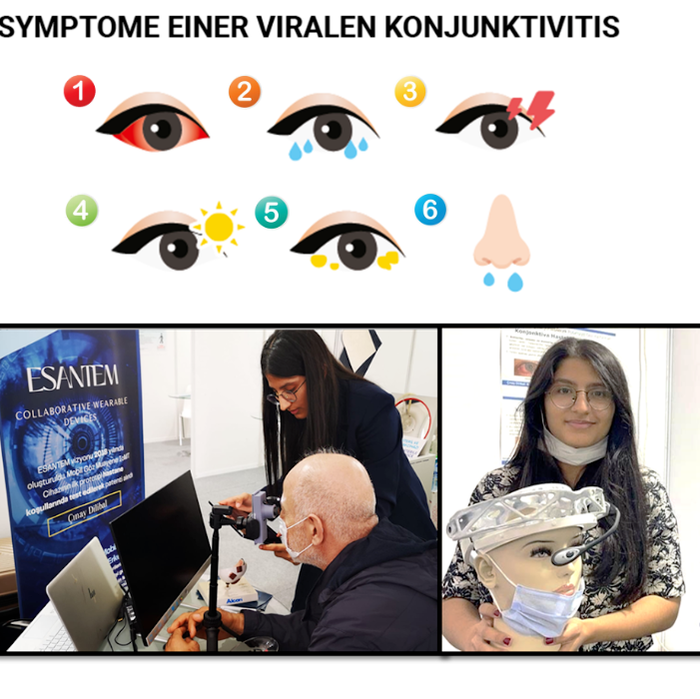|
We have a tendency to think in terms of doing and not in terms of being. We think that when we are not doing anything, we are wasting our time. But that is not true. Our time is first of all for us to be. To be what? To be alive, to be peaceful, to be joyful, to be loving. And that is what the world needs most. Thich Nhat Hanh |
This month's student quote:
The no in-class person examinations were great to relieve the stress associated with the Dartmouth classes and meant that the students learnt more overall through deep and long-term learning rather than short-term memorization. German 1 student comment |
This Project
A Mood Boosting Stroll: Walking and Talking with Filmmaker Volker Schlöndorff
Into the Woods: Reconnecting with Nature Through Flower Therapy
Oral Student Presentations on Mental and Physical Health
Transforming Assessment Practices: The Case for Take-Home Online Exams
This Project
GERMAN FLOW: A New Model for Language Learning at Dartmouth College
A pilot project led by German Studies professors Heidi Denzel and Nick Ostrau combines language learning with wellness practice. Newly awarded an experiential learning grant from from the Dartmouth Center for the Advancement of Learning (DCAL), the initiative encompasses collaborations with Caitlin Barthelmes, director of the Student Wellness Center, and Laura Beth White, assistant director for well-being. (More about this project.)
Faculty of Arts and Sciences Newsletter
"Foreign Language Offering Wellness in our German Curriculum"
In evaluations of the collaboration, students agreed that the integration of mindfulness and well-being practices helped mentally prepare them for class, focus better, be present, and enhanced their learning of German. (German Studies Department Implements Wellness Curriculum Into Introductory Classes by Ben Fagell | 1/13/23)
The Dartmouth
A pilot project led by German Studies professors Heidi Denzel and Nick Ostrau combines language learning with wellness practice. Newly awarded an experiential learning grant from from the Dartmouth Center for the Advancement of Learning (DCAL), the initiative encompasses collaborations with Caitlin Barthelmes, director of the Student Wellness Center, and Laura Beth White, assistant director for well-being. (More about this project.)
Faculty of Arts and Sciences Newsletter
"Foreign Language Offering Wellness in our German Curriculum"
In evaluations of the collaboration, students agreed that the integration of mindfulness and well-being practices helped mentally prepare them for class, focus better, be present, and enhanced their learning of German. (German Studies Department Implements Wellness Curriculum Into Introductory Classes by Ben Fagell | 1/13/23)
The Dartmouth
A Mood Boosting Stroll: Walking and Talking with Filmmaker Volker Schlöndorff
|
Strollology or Promenadology is the science of strolling (German: Spaziergangswissenschaft) and becoming aware of the conditions and perception of the environment. Greek Philosopher Aristotle already used walking exercises while teaching his students.
|
A Mood Boosting Stroll: Walking and Talking with Filmmaker Volker Schlöndorff (German 3)
Getting the body moving is a natural mood booster. (According to a study published in JAMA Psychiatry, just one or two brisk walks of 15 minutes a day can decrease the chance of becoming depressed by 25 per cent.) No one knows the benefits of walking better than iconic German Language director and Oscar winner Volker Schlöndorff. The passionate runner moved students and faculty in many ways during his campus visit in the spring term of 2023. The German Studies community was not only emotionally moved by his movie work and his talks in our classes, but also physically on indoor and outdoor walk and talks. In the pictures, Schlöndorff (84) moved Heidi Denzel's German 3 class up and down the stairs and around campus during Dartmouth German Studies' first official strollology experiment. Thank you so much for all your time, generosity and wisdom, Volker Schlöndorff! Keep it going and keep the camera running. |
Into the Woods: Reconnecting with Nature Through Flower Therapy
|
Into the Woods: Reconnecting with Nature Through Flower Therapy (German 14)
Scientific researchers in behavioral studies at Rutgers University have proven that flowers provide a simple way to improve emotional health – that the presence of flowers triggers happy emotions, heightens feelings of life satisfaction and affects social behavior in a positive manner. On a sunny morning in the spring term of 2023, students in Nick Ostrau's class German 14: Into the Woods: The Brothers Grimm and the European Folklore Tradition held an outdoor session on ecocriticist readings of fairy tales in the tranquil forest setting behind Dartmouth Hall. After a brief breathing exercise and a discussion of climate change in the fairytale forest and environmentalist concerns in KHM 62: Queen Bee, the class participants reached into a bag of wildflower butterfly and bee pollinator mix and planted each a handful of seeds in the surrounding area. When two weeks later a student checked on the plants, the saplings had started to sprout. Students who spend their sophomore summer on campus were encouraged to return to the woods and connect with the colorful blooms while studying or taking a respite from the bustle of campus life. |
Oral Student Presentations on Mental and Physical Health
|
Student oral presentation slide (German 2 in winter term 2023) of Cinay Dilibal'26 depicting her portable medical invention to diagnose eye disease.
|
Oral Student Presentations on Mental and Physical Health (German 2)
Nick Ostrau's German 2: Beginning language and culture class concludes with 10 to 15-minute oral student presentations based on the term vocabulary and grammatical structures and the topic of health, illness, and injuries from the course textbook. Each student may choose to present on one health condition of their choice. A list with topic suggestions is initially given (i.e. the flu, depression, conjunctivitis, bipolar disorder, diabetes, autism etc.) but students are encouraged to explore their own interests and ideas. The student presentors are asked to give an overview of their health topic (causes, symptoms, treatment, outlook, prevention, and quality of life impact). Presentations include a total of three images, photos, and diagrams to visualize their topic. Each presenter is further required to give a brief example for a person or person(s) who had or currently have this condition, either a public figure (i.e.: German soccer player Sebastian Deisler and his depression) or, if they wish, a person they know personally after asking permission from that individual or by redacting sensitive personal information. The presentation concludes with a Q & A session between the student presenter and their learning class fellows. Most importantly, this exercise gives students the opportunity to talk about physical or mental health concerns that others or they themselves have faced or still face, and to educate others about that experience. Students frequently choose health topics that have or had a direct or indirect impact on their own lives. A few cases in point: One student talked about their dyslexia and educated their fellow learners on the challenges they have faced since elementary school in regards to academic advancement. Using an artifact, the student invited the class to read through a paragraph with scrambled letters to help the audience understand how dyslexia affects learning. Another student presented on Attention Deficit Disorder and their personal decision on when and how much medication they needed. To illustrate, they shared two photo artifacts from their childhood, the first image showing themselves before and the second image after having taken medication. A third student talked about their grandparent's progressing Alzheimer's Disease and its emotional affect on their entire family, and a fourth about a close family member's progressive bone disease and the barriers to participating in public life due to limited wheelchair accessibility in their hometown. In course evaluations, students frequently report that the oral presentations provide them with a valuable emotional-psychological outlet: the task creates a space that allows them to share their experience with issues of illness, mental health, and neurodiversity with others in a positive classroom climate. Many also acknowledged the social benefits of educating their peers through demystifying illness, sharing the impact of various health conditions on peoples' personal and professional lives, and removing stigma connected to (mental) health concerns. |
Transforming Assessment Practices: The Case for Take-Home Online Exams
Transforming Assessment Practices: The Case for Take-Home Online Exams
Prepared by N Ostrau | Version: Nov 23
Introduction: In pursuit of a fair, inclusive, and effective assessment strategy, it is imperative to reevaluate traditional in-class exams. Recent studies have underscored this format's inherent biases and challenges, particularly for neurodiverse students. This recommendation sheet advocates for the transition to take-home online exams, with a non-restrictive timeframe open for two days, citing evidence on the impact of biorhythms, the honor principle, and the potential for a more conducive learning environment focused on critical thinking and deep learning.
Benefits of Take-Home Online Exams:
Take-Aways: Transitioning from in-class timed exams to take-home online exams with a two-day open window addresses the shortcomings of traditional assessments while aligning with principles of fairness, trust, and inclusivity. This recommendation aims to create an assessment approach that caters to the diverse learning needs of students, fostering an environment that supports deep learning and individual success.
Further readings:
Prepared by N Ostrau | Version: Nov 23
Introduction: In pursuit of a fair, inclusive, and effective assessment strategy, it is imperative to reevaluate traditional in-class exams. Recent studies have underscored this format's inherent biases and challenges, particularly for neurodiverse students. This recommendation sheet advocates for the transition to take-home online exams, with a non-restrictive timeframe open for two days, citing evidence on the impact of biorhythms, the honor principle, and the potential for a more conducive learning environment focused on critical thinking and deep learning.
Benefits of Take-Home Online Exams:
- Mitigating Biorhythmic Bias:
- Studies reveal that in-class exam outcomes are influenced by individual biorhythms, including the time of day an assessment is administered.
- Moving to take-home exams allows students to choose the timeframe that aligns with their optimal cognitive functioning, minimizing the impact of biorhythmic variations and promoting equitable assessment.
- Upholding the Honor Principle:
- In-class exams at our institution are not proctored, in alignment with our honor principle that establishes a trusting relationship between instructors and learners.
- Extending this principle to take-home exams maintains the integrity of the trust relationship, fostering a sense of responsibility and ethical conduct during assessments.
- Encouraging Deep Learning over Cramming:
- Timed exams often lead to cramming for short-term retention rather than meaningful engagement with the material.
- Take-home exams provide the flexibility for students to approach the assessment with a focus on deep learning, encouraging a more profound understanding of the subject matter.
- Improving Learning Environment:
- In-class exams frequently take place in overcrowded, uncomfortable spaces lacking personal space, proper lighting, temperature control, and noise regulation.
- Take-home online exams empower students to choose a comfortable and distraction-free environment, contributing to a more positive and focused learning experience.
- Facilitating Speaking Practice:
- Take-home exams can incorporate speaking components, such as audio responses, enabling a comprehensive evaluation of language skills.
- This inclusion aligns with modern language learning methodologies, providing a more holistic assessment of students' linguistic abilities.
- Optimizing Breaks for Enhanced Outcomes:
- Studies indicate that taking breaks during assessments can improve outcomes by preventing cognitive fatigue.
- The extended, non-timed nature of take-home exams allows students to manage their time effectively, including breaks for optimal cognitive performance.
Take-Aways: Transitioning from in-class timed exams to take-home online exams with a two-day open window addresses the shortcomings of traditional assessments while aligning with principles of fairness, trust, and inclusivity. This recommendation aims to create an assessment approach that caters to the diverse learning needs of students, fostering an environment that supports deep learning and individual success.
Further readings:
- Accommodating Diverse Circadian Rhythms:
- Smith, J., et al. "Variations in Circadian Rhythms and Cognitive Performance: A Comprehensive Review." Journal of Educational Psychology, 2022, 45(3), 123-140.
- Lack of Proctoring in In-Class Exams:
- Brown, A., et al. "Proctoring Discrepancies in In-Class Assessments: A Case Study of University X." Educational Assessment, 2021, 35(2), 201-218.
- Promoting Meaningful Engagement and Deep Learning:
- Johnson, M., et al. "Impact of Exam Format on Learning Depth: A Meta-Analysis." Educational Research Review, 2020, 28, 1-15.
- Creating a Comfortable Learning Environment:
- Williams, R., et al. "Effects of Learning Environment on Exam Performance: A Field Study in Higher Education." Journal of Educational Environments, 2019, 40(4), 567-582.
- Facilitating Accessible Learning:
- Taylor, K., et al. "Customizable Accommodations and Neurodiverse Students: A Case Study in Higher Education." Journal of Inclusive Education, 2023, 15(1), 78-95.
- Encouraging Critical Thinking:
- Anderson, L., et al. "Time Constraints and Critical Thinking: An Experimental Study in Higher Education." Journal of Educational Psychology, 2022, 48(4), 332-349.
Disclaimer: The information and resources on this website are provided for educational and informational purposes only and do not provide medical or treatment advice. You understand that such information is not intended nor otherwise implied to be medical advice or a substitute for medical advice, diagnosis, or treatment. The information should not be a substitute nor replacement for advice from a mental health or medical professional. You agree not to use any information found on our website to diagnose or treat a mental health, psychiatric illness, or medical disorder. Do not ignore advice from a mental health or medical professional because of the information you read on our website or the Internet.
If You Need Mental Health Support
Mental health support is available through Dartmouth 24/7 for students, faculty, and staff. Any Dartmouth student experiencing a mental health crisis can call the Counseling Center at 603-646-9442.
If you or someone you know is in crisis, call or text the National Suicide Prevention Lifeline at 988 or use the online chat at 988.lifeline.org.
Crisis response
Mental health and wellness at Dartmouth
If You Need Mental Health Support
Mental health support is available through Dartmouth 24/7 for students, faculty, and staff. Any Dartmouth student experiencing a mental health crisis can call the Counseling Center at 603-646-9442.
If you or someone you know is in crisis, call or text the National Suicide Prevention Lifeline at 988 or use the online chat at 988.lifeline.org.
Crisis response
- Call Uhelp 24/7/365 at 833-646-1526. (This is a service of Uwill.)
- Call the Dartmouth Counseling Center, 24/7/365 at 603-646-9442; identify that you would like to speak with the counselor on-call.
- Call Dartmouth Department of Safety and Security (at 603-646-4000 for immediate assistance.
Mental health and wellness at Dartmouth
- Primary Care and Dartmouth College Health Service (Dick's House)
- Counseling Center at Dick's House
- Uwill, our new teletherapy provider, (available 24/7 from any location)
- Student Wellness Center in Berry Library
- Pastoral Counseling through the William Jewett Tucker Spiritual Center




